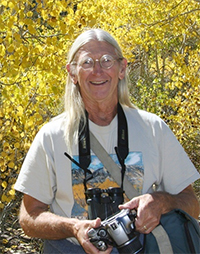FULLERTON COLLEGE CENTENNIAL
Partner With Us!
STAFF STORIES: ALLAN SCHOENHERR
ALLAN SCHOENHERR

I was hired to teach at Fullerton College in 1961. Fresh from finishing my MS from the University of Southern California I was 24 years old. I was hired to teach Personal Health Problems and Anatomy and Physiology. In 1968 I returned to graduate school at Arizona State University. I took a two-year leave of absence and ultimately received my PhD in Zoology. As the years went by I moved to teaching various General Biology courses including Cell Biology. For many years my primary assignment was in Vertebrate Zoology. In my final years at FC I taught mostly environmental courses including Environmental Biology, Natural History of California, and General Ecology. I officially retired in 1999, but continued to teach as an adjunct professor until 2007. During my first year in retirement, in 2000, I was selected as Teacher of the Year, an honor for which I am very proud.
Over the years I was often involved in writing curriculum. Frequently I was involved with development of new courses. In the early 1970s, Peter Tresselt, a Geology professor, and I decided to offer a course that would give students credit in both Physical and Biological Science. At the time, there was a major burst of environmental awareness among students, so we developed a course about natural history in California that was based on the interaction of significant plants, animals, and geology. It was an immediate success, and for many years was one of the first classes to fill. In order to provide reference material, I prepared a 772 page book called A Natural History of California. It was published by the University of California Press in 1992 as part of their Centennial Series of 100 special books. Since that time I became the author of Natural History of the Islands of California, and Wild and Beautiful: Natural History of Open Spaces in Orange County. During my tenure as a teacher, I also continued to publish scientific papers and became an authority on a small endangered fish, the Desert Pupfish, which was native to the lower Colorado River and the Salton Sea.
From the 1980s on I was involved with field courses that involved overnight field trips. Taking students on camping trips and introducing them to nature was one of my most important endeavors. As a different form of education, for many years I taught unique field courses during the summer. Students would pack their food and camping gear and we would leave town for a month. We held class in wilderness areas where we camped for a week at a time. Lectures and exams were held in the field, and students accomplished individual research projects. Between backpacking trips we would move to a new area, each of which was in a different habitat.
Throughout most of the 1990s and early 2000s I was involved with lecturing to various environmental groups and training docents to become trip leaders in our local parks. I am still on the board for the Laguna Greenbelt and an active member of the scientific advisory committee for the Nature Reserve of Orange County. I taught Natural History and Ecology at UCI and Cal-state Fullerton. I became a naturalist and ship-board lecturer for various companies that specialized in expedition cruising to remote parts of the world. For the Semester At Sea program, sponsored by the University of Pittsburgh and the University of Virginia, I traveled around the world four times while teaching Ecology and Marine Biology aboard ship to students from all over the United States.
I am often asked how things have changed since the early 1960s. In the early days there was a different sense of involvement in campus affairs. This was true of faculty and students as well. For example, attendance at football games was popular. Faculty from various divisions interacted socially. Faculty and older students (Vietnam veterans, etc.) would attend the games and go to a local pizza house to socialize afterward. Several times each semester, on the high school campus at Plummer Auditorium, there was a free concert on Thursday at noon. These concerts featured well-known performers and the performances were well-attended. During the 1970s and 1980s, in association with a nationwide period of environmental awareness, my classes were filled with enthusiastic students. In the late 1990s as students from more urban and diverse backgrounds filled the classes it became more of a challenge to generate interest in the out-of-doors.
Overall, my tenure at Fullerton College was a rich and rewarding experience. Many of my colleagues and students have become lifelong friends. It is rewarding that so many of my former students have become teachers or professionals themselves. I have had so many students over the years that I often encounter one or another in a public place. I am always pleased with that interaction and I am humbled when they tell me that I had an influence on them.